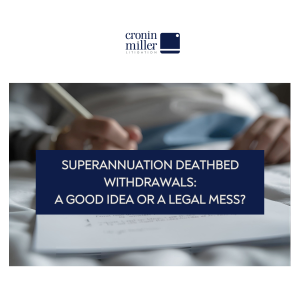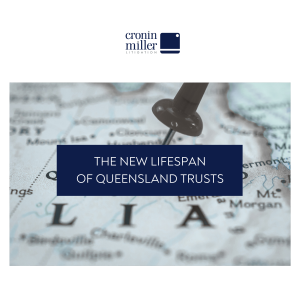A case study of Alternative Dispute Resolution – by Derek Cronin
Recently I was involved in a settlement conference.
The facts of the matter are relatively standard in my line of work. My client, a company director in his 50s, was in partnership with a wealthy businessman, aged in his 80s. The parties were to join in a property development, with ‘the brains’ (my client) and ‘the money’ (the wealthy businessman) to explore profit in partnership.
The foreshadowed profit did not come to fruition. They had subsequently fallen into dispute about a property on the Gold Coast, which resulted in a forced sale of the subject property by the mortgagee exercising power of sale. This resulted in a surplus of approximately $600K which was held in the trust account of the solicitors for the mortgagee.
The question remained – were the parties able to agree on a split of the $600K? Or would the parties engage in protracted and lengthy litigation which had been expressed in writing by both our firm (advocating for the case against the wealthy businessman) and the established Brisbane firm of solicitors which had been retained by the wealthy businessman
While each side made compelling arguments as to why they were each owed more than the funds in trust, neither party had taken steps to commence proceedings against the other for a protracted period of time. The assumption being that neither party was ‘prepared to put their money where their mouth is’.
The mortgagee eventually became impatient and made application to the Court for the funds held in trust to be paid to Court, with a portion to be retained by the mortgagee for its anticipated costs of defending a claim foreshadowed against it by the wealthy businessman. The mortgagee’s application gave both parties an incentive to sit down and talk to each other urgently and hence, a “without prejudice” settlement conference was promptly arranged.
In circumstances such as this it is common, both at settlement conferences and mediations, for the meeting of parties to involve what is known as a ‘joint session’. Namely, each of the parties sit and face each other in the boardroom while the experienced lawyers advocate for the respective client’s position – also known as ‘pulling out the sharp knife’. Basically, each side has an opportunity to say why their client will win, and the client on the other side will lose. It is an opportunity to canvass the factual and legal matters which will be subsequently litigated if the dispute is not able to be resolved.
On this particular occasion however, the parties had very high levels of emotion regarding the dispute. As former partners, they had an elevated sense of animosity, hurt, displeasure etc. regarding what they considered was the poor conduct of their opposite.
While in usual circumstances the ‘joint session’ might have possibly had some merit, in this case it would clearly achieve the opposite – all it would serve to do would be to remind each partner of what they disliked about the other, and the ultimate potential gain – that of reaching potential agreement – would be pulled right back to where the parties had begun, even though the delays of the past had caused them to be further away from conflict.
The process of “induction” or the “pre-conference meeting” between the two experienced solicitors on opposing side, allows the parties’ legal representatives to jointly develop a strategy of how the matter might properly be resolved. This involved the senior lawyers discussing which issues to focus on (and not to focus on) in the presence of the parties. The lawyers (at our request) agreed that rather than have a joint session, each of the sets of lawyers should communicate with the two parties separately, and in separate rooms. In that way, the emotional aspects of the dispute were able to be avoided, and the discussion could focus on the ‘mutual, neutral and future-focused’ aspects of the case.
For example:
- Litigation between the parties would mean that the funds in trust would not be released until the end of the litigation;
- Litigation between the parties would involve considerable delay – an estimated year to two years;
- Litigation between the parties would involve significant energy and angst; and
- Time spent by the parties spent on litigating would take them away from their families and doing other things more appealing than instructing lawyers.
More importantly, discussion of matters of prospects of success (by either party) were kept to a bare minimum. The two sets of lawyers, who attended both separate sessions with each of the parties, kept the discussion to the common interests of the parties (‘the blunt knife’).
While the wealthy businessman had every opportunity to allocate funds towards litigating the matter, it was unquestionable that it was attractive for him to resolve the matter early. He had much to achieve in his latter years in life and it didn’t make sense, no matter how strong he (or his lawyers) considered his prospects of success to be, to spend further lengthy periods of time in Court.
Although my own client felt that he had not been properly recognised by the wealthy businessman for his efforts in pursuing the partnership interests, he accepted that receiving a portion of the funds in dispute would be a better outcome given his personal financial circumstances.
In most settlements like this it is common for each of the parties to feel that they did not ‘get the win’, but in the end they both did. They are now free to move on, and the only ones to lose are the lawyers. Which in my view is never a bad thing.
Derek has been as solicitor for over 30 years in Commercial Litigation, Alternative Dispute Resolution, Insolvency and Bankruptcy, Defamation, and Small Business Disputes generally.
He has been recognised in Doyles Guide as ‘recommended’ in the areas of Commercial Litigation and Alternative Dispute Resolution, Insolvency and Restructuring.
Initial enquiries are free, please feel free to call him on 07 5592 6633 or at [email protected]



